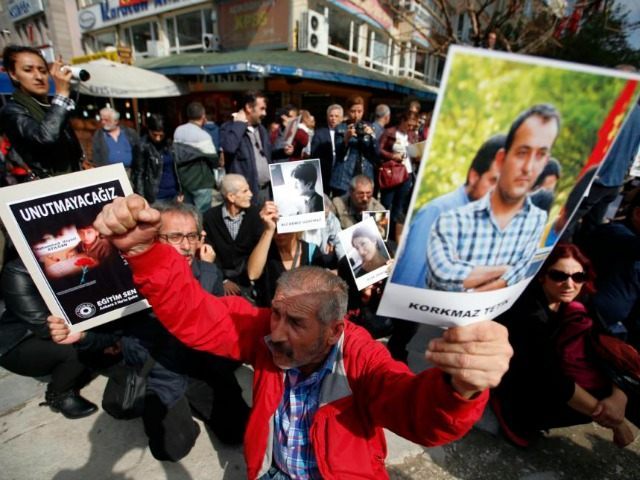Turkey is banning relatives of those killed or wounded in Saturday’s twin bombing of a peace protest in Ankara from assembling and protesting the government, citing “sensitivities at this time.”
The Associated Press reports that the relatives of those affected by the bombing–the worst terrorist attack in Turkey’s history–have been told by authorities that a rally organized by them and members of trade unions will not be allowed to occur on Tuesday both due to “sensitivities at this time” and the fact that such a rally would allegedly block weekday traffic significantly.
A number of anti-government groups rallied across the country on Tuesday anyway, however. The AP notes that at least one group encountered police resistance, with some being tossed to the ground while shouting, “Our brothers were killed! What are you doing?” In Ankara University, 200 students staged a sit-in protest in honor of the victims.
In addition, Prime Minister Ahmet Davutoglu himself visited the site of the blast on Monday, leaving red cloves for the victims near the Ankara train station. Several high-ranking Justice and Development Party (AKP) members accompanied him to pray for the dead.
Davutoglu has claimed that evidence points to the Islamic State being the organizers of the attack, and that the government has found five unidentified bodies, two whom they suspect were the suicide bombers themselves. Identifying them will be key to revealing who attacked the rally.
Out of respect for the dead and security concerns, the AKP has canceled a number of election rallies looking forward to the November 1 parliamentary election, in addition to not permitting rallies by government opponents. Protests on college campuses continued to occur, however, led largely by leftist student organizations and trade unions.
These protests follow large rallies on Sunday in which groups gathered chanting anti-government slogans like “Murderer police” and “Murderer Erdogan,” referring to the Turkish president. The protesters were largely prevented from approaching the scene of the crime, and even those relatives who hoped to leave carnations at the scene of the bombing were forced to turn back. Some were attacked with tear gas and water cannons.
At least 97 people are believed dead and dozens more injured after Saturday’s attack. Turkish officials have stated that the Islamic State is the prime suspect in the attack, which targeted a peace rally by Kurdish activists and supporters of the opposition Peoples’ Democratic Party (HDP). The head of the HDP, Selahattin Demirtaş, has explicitly blamed Turkish government leadership for the attack. On CNN Monday, Demirtaş accused President Recep Tayyip Erdogan and the AKP of “turning a blind eye” to the danger of HDP supporters congregating. “Ankara is a city where intelligence work is at its highest. And it seems there was no preventative work, no security arrangements in place,” he argued.
Protesters interviewed by Turkish media who were at the scene of the bombing seem to agree that the police presence at the event was minimal, until police felt it necessary to use water cannons and tear gas against angry protesters. “They left us in pools of blood where we had to cover the pieces of arms, legs and body parts, even pieces of their brains, with flags,” one woman told the Turkish newspaper Zaman. “This government is lying. No, the ambulance didn’t come. We had to pick up the corpses ourselves.”
A report in Turkey’s Hurriyet corroborates the claim of haphazard police work. Passersby and victims themselves claim they have had to personally collect body parts and remains of affected victims, left scattered about the bombing site. The site, opened two days after the blast to pedestrian traffic, is allegedly still polluted by burnt ashes and people. “This is human flesh and could belong to the suicide bombers. We need to notify the police,” citizens on a video showing the scene can be heard saying, Hurriyet reports.

COMMENTS
Please let us know if you're having issues with commenting.